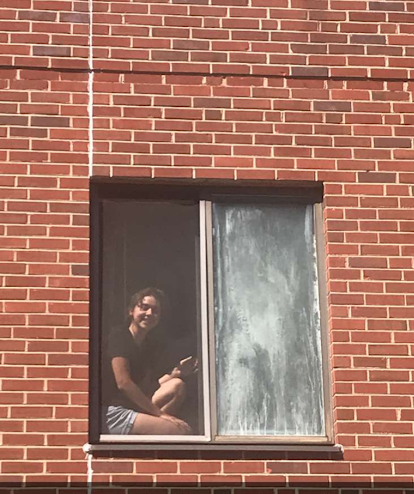Over the summer I heard about NMU’s plan to quarantine students in Spalding for 14 days and immediately the idea became my nightmare. To be confined in a room, alone with myself, sick, for two weeks, seven hours away from home with no power to leave—I found this way more terrifying than was reasonable.
Almost immediately when I arrived at school, however, I developed enough flu-like symptoms that the Vielmetti Health Center decided it would be prudent to isolate me. I reported for quarantine at Spalding, feeling quite upset with the general state of the universe. I was in quarantine for only one week until I received a second set of negative COVID-19 test results.
For those who also consider isolation in Spalding a nightmare scenario, let me offer some reassurance. It’s not actually that bad. It’s certainly not bad enough to lie if you feel ill or have a relative who tested positive, if those are options that have crossed your mind. Some of my friends have been talking that way, and frankly I don’t think that shows very much foresight or consideration.
Nearly all of the 50-some people who were quarantined at the beginning of the semester are out now and have survived the experience. Only two people remain in Spalding as of Sept. 2, according to the NMU COVID-19 dashboard.
The rooms in Spalding are quite like the quad 3 residence halls, but slightly older and larger. Hot meals are delivered from Northern Lights Dining directly to your door, according to your choices from a menu. There are towels, blankets and sheets in the room when you arrive. You have a provided fridge, box fan, microwave, two beds all to yourself, cold water, and microwaveable snacks whenever you want.
Most importantly to me, the considerate doctors, Dr. Christopher Kirkpatrick and Dr. Kayleen Papin, make themselves abundantly available over both calls and texts, so there is never a time where you feel abandoned. In addition, my residence director Chad Allard began a policy of calling me (and other quarantinees) every day to answer questions and be an advocate. President Fritz Erickson also did zoom meetings with the quarantine people to check in. Thus, isolation became less isolated.
To be frank, quarantine is almost just like winter in Marquette, in that you just stay inside all the time. No one is restraining you. In theory, you could walk out and face the consequences for putting others at risk. But the lack of actual imprisonment made it seem less claustrophobic, for me at least.
You can entertain yourself with Netflix, books, homework, and video chatting friends. In some ways quarantine didn’t differ very much from my usual introverted lifestyle, although I really craved a walk in the forest on many occasions. Friends often visited outside the windows while maintaining a 30-foot distance from the windows.
My biggest complaint about the provisions in quarantine was: I wished I had hot tea. Even though cough drops were kindly left on my door knob as part of a care package, I had a strong tea craving which I could not sate. Considering the severity of the problem of COVID-19, the minor inconvenience of tea deprivation was surprisingly my biggest issue, so I think we should be proud and thankful to the medical staff for their foresight in anticipating almost every other need.
Here are my suggestions for what to pack in your quarantine bag: lots of books, laptop and charger, phone and charger, all your textbooks, as many pajama pants and loose tee shirts as you own, many socks and undergarments, thermometer, shampoo and conditioner (soap bars are provided), Dayquil and Nyquil, pencils and pens, and notebooks for class.
In any case, as long as you’re patient and a little prepared for the eventuality, quarantine is nothing to worry about. If it becomes necessary for you, know that you’ll be cared for and it will turn out just fine.

























